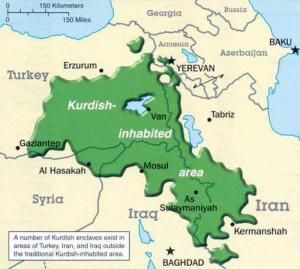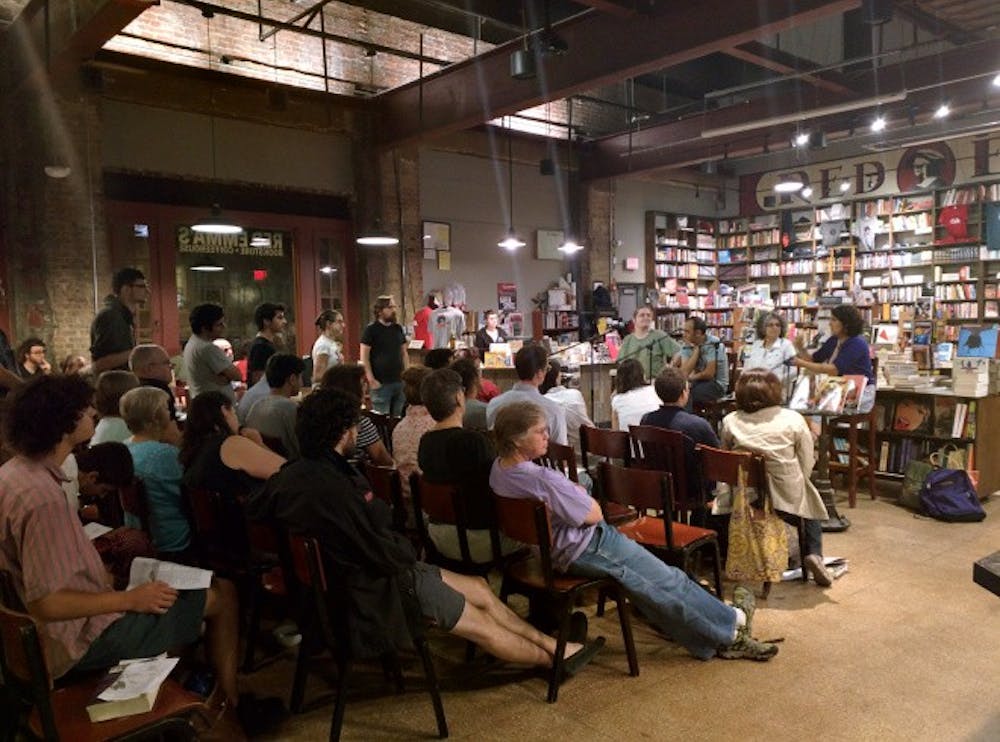By WILL ANDERSON
Three Kurdish activists spoke about their experiences and persecution in Syria, Iran and Turkey as well as the future for the Kurdish people fighting the Assad regime in Syria and the so-called Islamic State (IS) at Red Emma’s Bookstore Coffeehouse on Saturday, Sept. 5.
The Kurdish people are an ethnic group that traditionally inhabit areas of Iran, Syria, Iraq and Turkey. According to the panelists, they have been marginalized by these nations in favor of the dominant ethnic groups of these states.
Golala Arya is a Washington, D.C.-area Kurdish activist who fled from Iran to the United States 20 years ago to escape persecution. She detailed her life under the Iranian Islamic theocracy and her fear of going to school. She also described a curtain that separated men from women at a beach on the Caspian Sea.
“Under a theocracy, 50 percent of society will certainly lose their rights,” she said. “The human rights that we take for granted in the West are going to be gone with the wind. As a girl your identity is stripped from you.”
Ruken Işık is a University of Maryland Baltimore County (UMBC) graduate student in the gender studies program who was imprisoned by the Turkish government because of a campaign she ran as a student activist.
“I was a university student in Istanbul. We launched a language campaign, [and] we petitioned the university for an elective Kurdish course,” Işık said. “I was imprisoned for five months and had to leave university for two years.” Omer Pacal is a member of the People’s Democratic Party (HDP), a Turkish, pro-Kurdish political party that won 13 percent of the vote in the June 2015 election, surprising political commentators and denying a majority to the ruling Justice and Development Party (AKP).
With the Mediterranean migrant crisis dominating headlines around the world, Işık gave background on the current situation. Since the Syrian Civil War began in 2011, millions of Syrians, Kurds included, have fled the country. Many Kurds are denied citizenship in Syria and exit visas that would allow them to apply for asylum elsewhere.
Seeing no other option, many people either make the dangerous voyage across the Mediterranean Sea in search of a better life in the European Union or fight against IS and the Assad regime. Millions more live in refugee camps in Lebanon, Turkey and Jordan. Human trafficking, especially of women and children, is rampant, and war dominates the landscape of Syria and Iraq. Historically the main Kurdish political party in Turkey has been the formerly Marxist-Leninist Kurdistan Workers’ Party (PKK) under the leadership of Abdullah Öcalan, who has been imprisoned by Turkey under terrorism charges since 1999. The PKK has carried out attacks on Turkish army posts, and both Turkey and the PKK have been accused of crimes against humanity.
In 2000 the PKK, branded a terrorist group by the United States and Turkey, changed its ideology. They moved away from formerly communist ideology and instead began advocating for the idea of “democratic confederalism,” an ideology that consists of decentralization of the state, local democracy, gender equality and community ownership of factories, farms and natural resources. The current Kurdish revolution in Syria is striving to create a confederation with these principles at its core, according to the panelists.

Işık discussed why the PKK changed their ideology and explained that gender equality is so important to the Syrian Kurds that each district is run by one male and one female co-administrator, with at least 40 percent of all positions ideally filled by women.
Işık also spoke of an Arabization campaign by the Assad regime in Syria in which Kurdish culture and language are suppressed in favor of Arab culture and where Kurds had their government issued identification withheld.
“150,000 Kurds in Syria were stripped of their IDs. Now it’s estimated to be 500,000,” she said.
In January 2014, minorities and Kurds from Northern Syria, led by the Kurdish Democratic Union Party (PYD) and their armed forces, the People’s Protection Units (YPG) and Women’s Protection Units (YPJ), declared democratic autonomy.
Işık explained why the women’s fighting units that have gained attention in Western media are so effective. The all-female Kurdish YPJ units have been praised for furthering the role of women in the Middle East and also as an effective fighting force against the forces of the Assad regime and the Islamic State.
“They didn’t just want to be a party for Kurds. They wanted to be a party for all Syrians,” she said. “[The troops say,] ‘We are not fighters, we are defending our lands and women. This fight is not for the Kurdish people, it’s for humanity.’”
The HDP member Pacal explained more of the origins of the confederalist approach of the Syrian Kurds and why the PKK changed its tactics in 2000.
“The PKK was fighting to unite the four Kurdistans [in Syria, Iran, Iraq and Turkey], but the nation-state was regressive for human evolution,” he said. “It was a handicap for the socialist revolution. The solution should be based on an anti-capitalist, anti-industrialist, women’s emancipatory ideology.”
According to Arya, Kurds are disproportionately executed in Iran, and she described seeing publicly executed people hanging from cranes as a warning to all those who would break the regime’s laws.
“For me, cranes [still] mean gallows,” she said.
After escaping from Iran she stayed in Turkey for 13 months in 1994 as a refugee. She described the repression she faced in Turkey where she was not allowed to speak her native Kurdish language, just alike in Iran.
“I can’t tell you enough about the corruption of Turkish police,” she said. “We had three families in our house for a month, sleeping like sardines. You go back to the Islamic Republic of Iran after leaving [without permission], it’s the gallows, prison.” Arya said that in Iran and Turkey she felt like one fourth of a person, half a person as a Kurd and half a person as a woman. “You’re second class. In Turkey in 1994, I couldn’t even say I was Kurdish,” she said.
Arya made a final appeal to the audience to become more informed about international crises.
“If we don’t care about what’s going on with each other, we aren’t human,” Arya said. “Those little voices make a difference. Talk about the exclusion of minorities, how women are second class. I don’t think in my life, but hopefully, one day we’ll see peace in the Middle East.”
Sophomore Ava White said that the event was narrowly focused but a worthwhile way to spend time and also referred to the fact sheet provided by the event that contained a map and a list of acronyms.
“There were strong speakers, a lot of detail, and you really needed that answer key,” White said.





